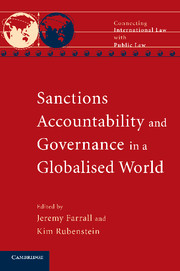Book contents
- Frontmatter
- Contents
- Contributors
- Series editors' preface
- Editors' preface
- Introduction: Filling or falling between the cracks? Law's potential
- PART I Setting down the foundations
- PART II Internationalising public law
- PART III Implementing Security Council sanctions
- PART IV The place of corporations
- PART V The role of lawyers
- 11 International legal advisers and transnational corporations: Untangling roles and responsibilities for sanctions compliance
- 12 What is the right thing to do? Reflections on the AWB scandal and legal ethics
- PART VI Public law and public policy
- PART VII Parallel case studies
- Concluding remarks
- Bibliography
- Index
11 - International legal advisers and transnational corporations: Untangling roles and responsibilities for sanctions compliance
Published online by Cambridge University Press: 05 October 2010
- Frontmatter
- Contents
- Contributors
- Series editors' preface
- Editors' preface
- Introduction: Filling or falling between the cracks? Law's potential
- PART I Setting down the foundations
- PART II Internationalising public law
- PART III Implementing Security Council sanctions
- PART IV The place of corporations
- PART V The role of lawyers
- 11 International legal advisers and transnational corporations: Untangling roles and responsibilities for sanctions compliance
- 12 What is the right thing to do? Reflections on the AWB scandal and legal ethics
- PART VI Public law and public policy
- PART VII Parallel case studies
- Concluding remarks
- Bibliography
- Index
Summary
Introduction
The legal advisers employed by foreign affairs departments, and the advice they provide, are increasingly the subject of public scrutiny. US lawyers, for example, reportedly interpreted the Convention against Torture to enable interrogation and their English counterparts controversially identified a legal basis for military force against Iraq. The latter issue also arose in Australia, similarly attracting debate, as did a legal memorandum concerning the maritime interception of asylum seekers.
Such circumstances give rise to several questions, particularly the relationship between government legal advisers and the executive branch of government, for which there are various solutions. This chapter examines the circumstances where national corporations receive advice concerning prospective sanctions compliance from their Foreign Ministries, and the potential application of administrative law principles in such cases. This discussion springs from correspondence identified by the Cole Inquiry in which the Australian Department of Foreign Affairs and Trade (DFAT) could see ‘no reason from an international legal perspective’ why the Australian Wheat Board (AWB) should not proceed with proposed arrangements involving Jordanian trucking companies under the UN's Oil-for-Food Programme (OFFP).
Section 2 outlines the classical function of international lawyers employed by governments, posing the question whether advising corporations on sanctions compliance heralds a departure from that role. Section 3 reviews the unique regulatory framework Australia employed to implement sanctions against Iraq under the OFFP. Although these administrative arrangements have since been superseded, this historical case study nonetheless offers several generalisable lessons for contemporary discussion of the role of legal advisers and their interactions with national corporations.
- Type
- Chapter
- Information
- Sanctions, Accountability and Governance in a Globalised World , pp. 263 - 288Publisher: Cambridge University PressPrint publication year: 2009

